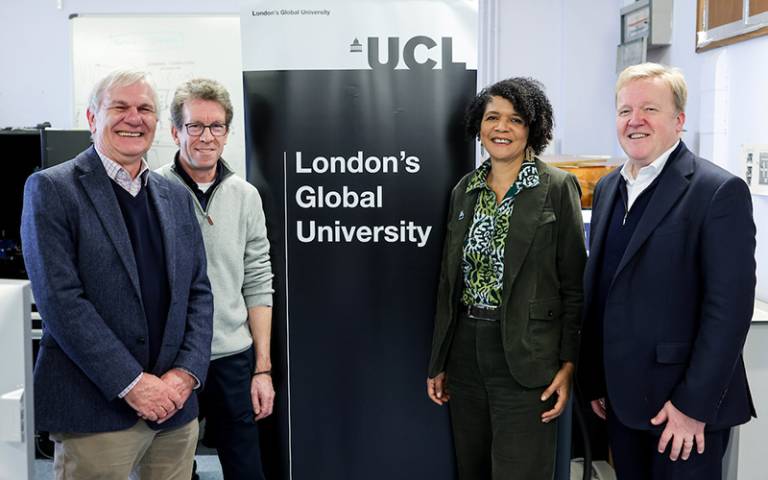UCL hosts Shadow Science Minister to discuss the future of artificial intelligence
7 February 2024
Shadow Minister for Science, Research and Innovation, Chi Onwurah MP, visited UCL’s Faculty of Engineering this week to meet with AI experts from research and industry.

Ms. Onwurah was welcomed to UCL by Professor Geraint Rees, Vice-Provost for Research, Innovation & Global Engagement, and Professor Graeme Reid, Chair of Science and Research Policy.
The members of the delegation discussed a range of topics including the importance of investment and skills, both of which will be crucial to further develop London’s status as a leading centre for AI research.
Several UCL start-ups and spinouts gave presentations highlighting their work. Professor Lourdes De Agapito Vicente (UCL Computer Science) talked about the start-up that she co-founded, Synthesia, which uses generative AI to create videos without the need for cameras or equipment. In 2023 it achieved ‘unicorn’ status by reaching a valuation of $1 billion while remaining privately owned.
Buffy Price, Co-Founder & Interim CEO at Carbon Re, also talked about the UCL spin-out’s mission to reduce carbon emissions from the construction industry using AI.
Chi Onwurah MP, Shadow Minister for Science, Research, and Innovation said: “Scientists and researchers at UCL are doing exciting work in cutting edge fields like AI and nanotechnology, generating huge social and economic value. It was fascinating to learn more about UCL’s start-up and spinout success, which is attracting global investment. I want to learn the lessons from places like UCL to understand how best we can leverage this country’s exceptional research base to deliver Labour’s aims: economic growth, better health outcomes, and progress towards Net Zero.”
After the discussion, Professor Tony Kenyon led a tour of laboratories in the UCL Department of Electronic and Electrical Engineering, where work is underway to develop neuromorphic, or ‘brain-inspired’, computing. Professor Kenyon also talked about Intrinsic, the UCL spin-out that he co-founded to develop next generation semiconductors.
Professor Rees, UCL Vice-Provost for Research, Innovation & Global Engagement, said: “It was a pleasure to welcome Chi Onwurah today to hear about some of the fantastic start-ups and spinouts that have emerged from UCL in recent years. We’re incredibly proud of the environment that we’ve created for capitalising on the leading-edge research happening here, which is evident in the diverse range of successful businesses showcased today.
“There is a golden opportunity for the UK to cement its status as a leading centre for artificial intelligence in the coming years, particularly through investing in the next generation of scientists, engineers and entrepreneurs.”
The visit took place at an important time for AI, with the technology rapidly advancing and policymakers working to ensure the benefits for society can be fully realised while mitigating for potential harms.
Links
- Chi Onwurah MP
- Professor Geraint Rees's academic profile
- Professor Graeme Reid's academic profile
- Professor Lourdes Agapito's academic profile
- Professor Tony Kenyon’s academic profile
- UCL Electronic & Electrical Engineering
- UCL Computer Science
- UCL Engineering
- UCL Innovation & Enterprise
Image
- Professor Graeme Reid, Professor Tony Kenyon, Chi Onwurah MP and Professor Geraint Rees. Credit: UCL/Parsons Media.
Media contact
Matt Midgley
Email: m.midgley [at] ucl.ac.uk
 Close
Close

